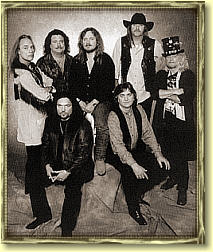| |
At
first, during the "Tribute'" tour, the
band played "Free Bird" instrumentally...
Van Zant:
I remember, it was in Sacramento. Gary came back
and said he wasn't gonna play ""Free
Bird"' anymore, not unless I sang it. He
said Ronnie was a songwriter and a singer, and he
wants you to sing those words."
Was that a scary moment?
Van Zant:
Sure, it was. That's a tough song to sing. I used
to think the Skynyrd songs were a piece of cake
to sing, but there's a lot of attitude, little
things, especially "Free Bird," there's
a lot of little low notes, little things Gary and
I have to tune in on because the slide guitar
goes with the vocal. If we're not right on pitch,
we're crashing. |
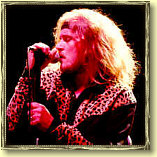
Johnny Van
Zant |
Krantz-Rossington:
Johnny's grown up over the years. He's come a long way.
It was tough to see him grow up into this role, believe
me,
but it was beautiful in a very bittersweet, tough way; we
had to pull those "Free Bird" lyrics out of him.
We had to fight
him to get him to do it. I remember Gary saying, "I'm
not gonna play it one more night if you don't get out
there and
sing it." And Johnny said, "Well, I won't."
Gary said, "He wrote those words, he wants people to
hear the words."
He didn't care about doing it instrumentally anymore.
Johnny's come a long way .
Thomasson:
Johnny is always a surprise. I've known Johnny since he
was knee-high to a grasshopper.
The Johnny Van Zant Band, he had his own band. He's doing
a fabulous job. There's nobody else on this earth who
could stand in and do what he has done. He may be the one
that knows it the least of all. He's not one for patting
himself on the back, but his brother would be proud of
him.
The current lineup came about after Ed King,
who'd been part of the reunion lineup,
had to leave for health reasons.
Thomasson:
The band called up and said they needed someone to fill
in for Mr. King; he had health problems.
The Outlaws were still playing. I would have not done
this, had it been any other band. I've been offered jobs
with
numerous bands with much higher stature than the Outlaws,
and I turned them down, because, while it was a great
honor to be asked, I wasn't done with what I was doing,
and it wasn't the kind of music I wanted to play.
This was the only band that I would have even considered
playing with, much less being here right now, doing this,
because it's a rock 'n' roll band. That was three years
ago, and I'm still here, so I guess I passed the audition.
Rickey came in right after that.
Rossington:
Ed King had a heart problem, and he had to get off the
road, so we got Hughie. And I had just seen Rickey at the
premiere of the "Free Bird" movie in Atlanta.
We almost thought at first we didn't know if he could
just settle down
into a sideman role; he was fronting his own group,
Blackfoot. He was pretty wild, and he just did his thing.
But he fit in perfectly. He's just a good old boy. He was
around; we all knew each other. We started together.
He was part of the Skynyrd blood.
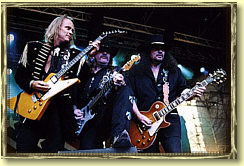 |
Medlocke:
When we did the "Free Bird" movie
premiere with that all-star jam, I got a call
from Judy Van Zant, Ronnie's wife, who said,
"We really want you to be part of this."
I was getting ready to go on tour with my own
band, so I had to cancel two weeks' worth of
dates to do it. The band wasn't too happy with
it, but what can you say?
My ma, Ruby Juanita, had died in March '94; this
was 1995, a year later, so I was thinking about
her. She told me everything would turn out OK
after she was gone, and it was really weird to me
because, all the way up there, I was thinking,
"Is this what she had in mind?" Because
she loved them guys an awful lot. I don't think
Gary and Ronnie and Allen ever really realized
how much she cared about them guys from when they
used to come over and sit on the porch with my
dad and listen to him play. |
"Simple Man"
was always her favorite song. I remember coming home and
hearing her playing it on her 8-track.
Ruby Juanita Medlocke. She was Shorty's wife. I remember
her saying, "Once I'm out of the way, everything's
gonna be all right."
After the jam, I got the call on my answering machine:
"Hi, this is brother Gary. I want you to learn
"I Ain't The One,'
"Saturday Night,' "That Smell' and "Free
Bird,' and I'm comin' over to audition you, and if you
pass the audition I'm
gonna give you $1.50 and put you in the band." So he
came down to my house, I sat down with my boombox and my
little amp, and I played "I Ain't The One" note
for note. He didn't listen to the rest of it. He said,
"You should be in
this band, let me call Johnny." Johnny was worried
that I wouldn't want to be just a guitar player because I
was a
singer and a front man all these years, but I remember my
daddy always told me, "If you can't be a passenger
in
the back seat of a car, you'll never get to be the driver."
I said, "It's all yours." I promised Gary, on
top of it.
Allen was such a special person and friend. I'll learn
all those songs note for note, leads and everything, and
I'll
try to be your Allen in the band."
I play the things note for note, and I try to enhance it
with my own style, to pay tribute to what he did.
Coincidentally,
me and Allen's styles were very similar, and we played
the same style guitars. It's weird that it came out that
way.
Every once in a while, Gary or Leon will say, "It's
the eeriest thing, a lot of times when you've got your
back to us like
Allen, the way you move on stage makes it look like it's
him there." I don't notice it because that's the way
I've always
done things. It's just a pleasure being here.
Krantz-Rossington:
When Hugh and Rickey came into the band, there was
another shot of energy, but then they became part of it.
It's not just seven members or nine members; this band
has always been an entity unto itself.
Once they got settled into a groove, everything got
really exciting.
Rossington:
God bless the guys that died, but then there was a lot of
other ones that are still with us, where we had our
falling-outs
or partings of the ways, but you lose each other too.
Losing someone who's still living is hard too, if you're
arguing or
not working with them, it's still hard feelings. We go
through drummers like underwear. I think this music wears
drummers out. This lineup is it.
Wilkeson:
Sometimes I think we should call the band Skynal Tap.
Van Zant:
In the past, since I've been in the band, some of the
members didn't get along together that well.
Being a team is essential. That's why they call it a
band, it's a teamwork thing.
If somebody's not picking up the ball, somebody else gets
it.
As the new drummer in the group, were you a
Skynyrd fan?
McAllister:
It's unAmerican not to like Lynyrd Skynyrd. I was with
Hank Williams Jr. for three tours. In 1995, we toured
with
Skynyrd, and I got to know Johnny and Leon a little. Hank
is liable to throw in a couple of Lynyrd Skynyrd songs in
his sets, "Sweet Home Alabama," "Gimme
Three Steps", you really have to be on your toes,
you never know what
he's gonna throw at you. Johnny and Leon went out to hear
me play a couple of times, and, when their last drummer
spontaneously combusted, they gave me a call. Playing
with Lynyrd Skynyrd is physically taxing on the drummers,
it's a workout. You've got to hit 'em as hard as you
possibly can, which I do every night. You have to go for
the throat.
The new songs you've been writing fit right into
the Skynyrd mold.
Thomasson:
One of the things that was discussed is that we
had to maintain the Lynyrd Skynyrd sound.
Even though we had two other guitar players, like
Rickey and myself from two other dominant bands
like Blackfoot and the Outlaws, we'll forget
about Blackfoot and the Outlaws. This is Skynyrd.
That's how we dealt with that, and that was the
right way to do it. We focused totally on
Skynyrd,
went back and listened to the old stuff,
refamiliarized ourselves with the style of the
band, talked
about it and wrote the songs with that
understanding. And, if it didn't sound like
Skynyrd, boy,
it got tossed right away.
We work really hard at writing new material. We
all sit down with an open mind, and we all throw
ideas out, and we weed "em out real quick
between Gary and Johnny especially; they can tell
if it's sounding like a Skynyrd lick or not. So
we get rid of the stuff that doesn't fit
immediately, focus on the stuff that is the
Skynyrd lick, work on those. We have so many
ideas that it's not hard to do that. |
 |
Medlocke:
Gary and I had written songs before, in the early days,
but the four of us had never written together.
Gary was in Skynyrd, Johnny and Hughie and I had our own
bands, each guy collectively successful.
We didn't know how to start. I would try to come up with
a chorus and an idea on guitar.
Hughie and Gary would play ideas, and we all picked up on
each other and cut our own little niche while we did it.
I put myself in what I call "the Lynyrd Skynyrd
frame of mind."
Van Zant:
It's taken a while for me to fit into Lynyrd Skynyrd.
Hopefully, it only gets better. The writing thing is
starting to come
around, especially with this lineup, with Rickey and
Hughie, myself and Gary. We have a blast writing together.
We just got through writing four songs down in Nashville.
We've got one called "Workin,'" another called
"Big Brother."
"Workin'" is just about getting up and doing it
every day, no matter what; we all work. "Big Brother"
is about, hell, you
can't sneeze these days without somebody knowing about
it, there's a camera or something.
I've always been compared to Ronnie 'cause we're all from
the same family. It's always been around us, all my life,
and every song I've ever written has always had a message
to it. I think that's the one cool thing about Skynyrd,
a message in a song.
Rossington:
We've been out on the road with some bands who've been
around for a while. They don't look the same, they don't
play
the same, they don't sound the same. We're real proud of
ourselves because we're still there. Everybody knows it's
not
Ronnie and Allen and Steve anymore, it's Johnny and
Rickey and Hughie, and they're coming to see us, they're
coming
to see this band. It ain't new Skynyrd to me, it's just
the continuation of Skynyrd.
Johnny took Ronnie's place, but Ronnie would have loved
that. He's been with me longer than Ronnie was now,
so it's kind of cool, Skynyrd has gone on. We do the old
songs good or better than ever, and the new stuff is us
now.
Powell:
We worked really hard on "Twenty" to get back
to our roots. It has a live-room, noise-in-the-studio
sound.
We recorded it at the Muscle Shoals Sound studio. Ego,
success has never gone to our head.
That's why we're still around. We're not that much
different than you. The ego is the sign of downfall with
most bands.
Rossington:
We just stick with our music. Music's our gimmick and
what we do. You either dig it or don't.
We play the music with our own style. I think it's time
again. Things go around in circles.
I think people are ready for us again.
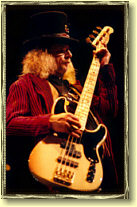 |
Wilkeson:
I think we are, right now, the best lineup since
the beginning.
I roll with the changes. I'm on the seventh
drummer now.
The last two drummers were studio-experienced, so
they could read charts, which makes
it easier to show them what to do.
But it's still more the attitude and personality
and the team spirit that has to be good.
This lineup now is where the band has been
striving to be since the plane crash.
Now is the happiest, most positive it's been
since the tragedy.
Every night is exciting, and it seems to get a
tad better each show.
I kind of wish we had waited on the live album,
because we're even better now. |
How long
can you see yourselves doing this?
Powell:
The Rolling Stones are in their mid-50s. We're in our mid-40s,
and they're still doing it, so we don't see any reason
why
we can't. And, right now, there's a new electricity and
fire in this band. Being sober, nobody gets in fights
anymore.
There's a new electricity, and that surprises me. I
thought we'd all be sitting around in chairs when we were
pushing 50.
How many more years do we have ahead of us? I'm hoping 10,
but, if that comes, who knows what might happen?
Medlocke:
If the band quits enjoying what we're doing, playing and
touring, we probably should get out of it and not let it
fall to
the bottom, where everybody goes, "These guys are
tired old rock 'n' rollers." I think consistency is
very important.
The band has that consistency every night. We're not beat
up and fractured, angry at somebody, screwed up on drugs
and alcohol. We want to appreciate what we have while we
have it and be able to hold on to it as long as we can
hold
on to it and give that audience; especially the young
ones who are coming out now, which is an incredible thing
on its
own; we want to give them their money's worth every show.
Sixty-five percent of our audience is teenagers now.
Now you have mosh pits in front of the stage.
Rossington:
Lynyrd Skynyrd with a mosh pit! These kids get going and
the kids are body surfin', passing each other across the
top of the crowd. At first, it freaked us out. Johnny was
afraid somebody was getting seriously hurt, and his kid
had to say, "Dad, this is what we do, it's cool to
do that." When you see it and they're having a good
time, there's
just nothing like it.
Carol Chase:
We were playing this little gig in Italy, and the
people were crying; they couldn't believe Lynyrd
Skynyrd had come there. Then they did the soccer
chant at the end; we had to come back and play
again.
Krantz-Rossington:
It has really picked up over the last year,
especially this year. Looking out and seeing
these young kids moshing to "Simple Man,"
we knew it had crossed over to another generation.
Chase:
I think kids are surprised at how much energy we
do have. I think they thought this was their
parents' band. |
 |
Medlocke:
It's almost like a new birth of the band. I just wanted
to play music; I never thought it was going to be as big
as it became.
It freaks me out when I start thinking about it.
Thomasson:
We're on a mission. We know we love what we do, and we're
blessed to be able to do it, so we try not to forget that.
We're fortunate that this many people are into Lynyrd
Skynyrd and want to see the band.
It's fun for me again. There was a time when I was
successful, but the thrill was gone out of it. It's back,
it's real,
it's exciting. I'm gonna make the most of it. I'm looking
forward to going back on the bus, that's how much I like
it.
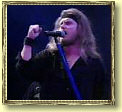 |
Van Zant:
The cool thing about doing this now is that we
have gotten so many young kids turned on to us,
it's amazing. I love the old fans, too, don't get
me wrong, but it's really cool to take the music
to
new fans too, who never got to see the band. It's
like Ronnie was the quarterback and I'm the
receiver going for the touchdown.
Do you feel Ronnie's spirit on stage?
Van Zant:
I can feel his presence every time we're out
there. You can't possibly not feel it.
There's a driving force behind Lynyrd
Skynyrd that's bigger than any of us. |
|
|
